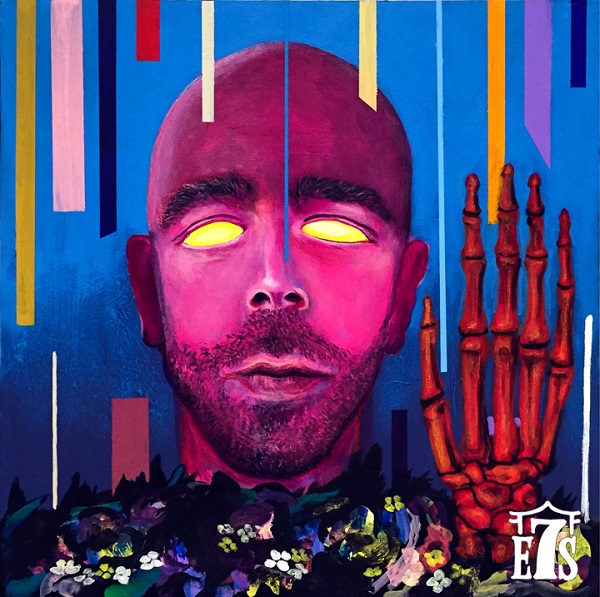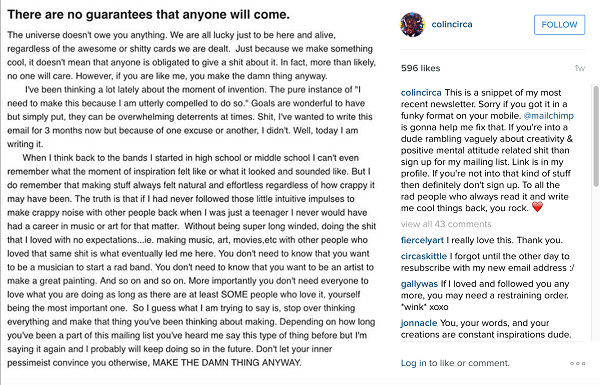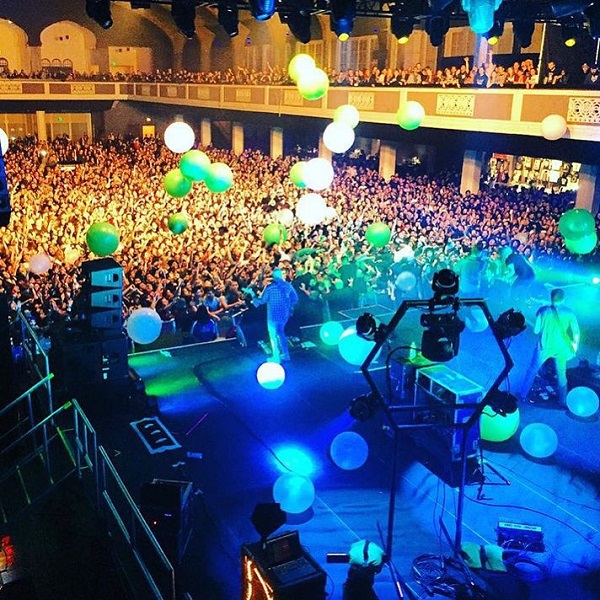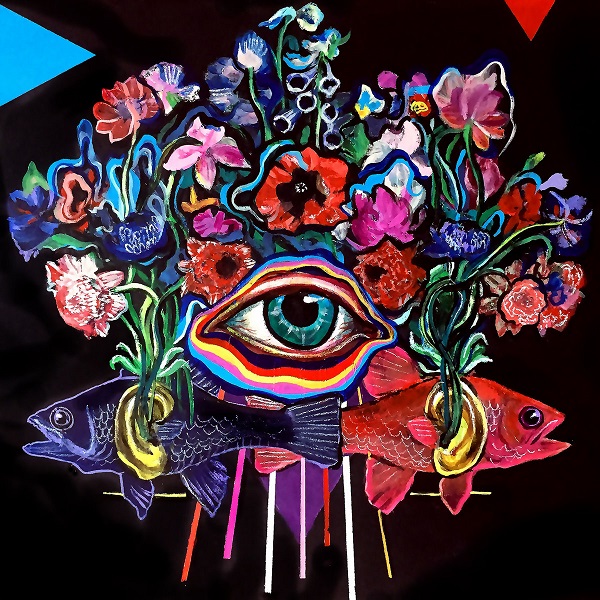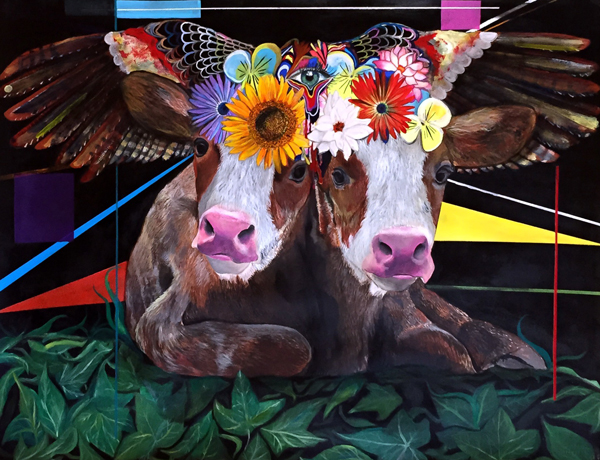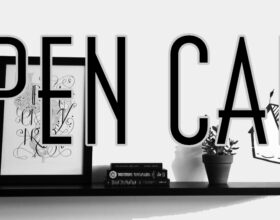Open Call: Make Your Own Mountain | Special Edition with Colin Frangicetto
Welcome to the 19th edition of Open Call. Today we’re talking with visual artist, founding member of Circa Survive, and jack-of-all-trades, Colin Frangicetto about Doing It Yourself, self-doubt, hallucinogens, and finding inspiration in the face of an uncertain future.
We love hearing from you so please email us at [email protected] with any questions you have, concerns, success stories, challenges, or any other topic you’d like to discuss with a Gallery Director. Every other Monday we’ll publish a few of our favorites along with my replies. If you don’t see your email published, it does not necessarily mean it won’t be saved for a future installment. There have already been way too many good questions to make it into just one edition. Visit my online author profile and stay updated on past editions.
PS: I want to jump right into your last newsletter because you hit on a lot of things that I try to talk about here in this space, doing things for yourself, and setting your own goals, how important it is to be recognized and things like that.
You and I have always done sort of different things, always related to each other but focused on different parts, but we come from a similar background in growing up and coming up in punk rock and hardcore and places with a very strong Do It Yourself and build-it-yourself vibe and ethos. Not that what we did is unique in that way, but it was a strong part of that scene. I know I feel like I’ve carried that with me in everything I’ve done since. How much of that do you plays into how you approach what you do, being an artist, or being in Circa, and that feeling that you have to make your own path, and it’s up to you to fix your own problems, and you can’t waste any time waiting around for someone to give you some sort of a golden ticket?
CF: Oh my god. That is so key. If anyone pays attention to anything that we’re talking about, I hope it’s that, because I think it’s all there. For me it’s all there. Punk rock and being a part of a community where you almost – it wasn’t even a question of getting invited to the party, you almost assumed you weren’t invited so you threw your own party. With music and DIY, it almost made it as if you had to be a jack-of-all-trades. You had no other choice. You’re going to have to write you own music, record your own music, design your own t-shirts, design your record sleeves, to figure out how to manufacture those sleeves. I remember having to figure out the dimensions of a cassette case just so I could design my own layout, and then go to Kinko’s and get it made. There was no way – I guess we had like, AOL, but there really was no way to be like “click. click” and you had it done for you. That just wasn’t happening yet. I loved that to be honest, and was thinking about this the other day… about how effed up it was that even before that happened in my life. And how when I was a little kid we’d be sitting around figuring out what to do, and I’d be like “okay, we’re going to start a club,” and the other kids would be like, “okay what’s the club?” and I’d make up some weird theme and then immediately explain that we’d have to start designing the membership cards, haha. I was always into taking a group of people and creating something, that weird feeling when you attribute meaning to something that you’ve made.
PS: You said in the newsletter that as long as you love what you’re doing yourself, that’s the most important thing. Whatever it is you want to make, or build and it goes beyond music or art, just make it anyway.
CF: Totally. A huge gift I was given with Circa as an experience was going through the period of being an indie band building from nothing and having all these people love it. Then trying to jump to a major and having this huge corporate machine and they weren’t able to grow us in any bigger way than we grew ourselves before that. And the band’s progression has never changed no matter what label we have been on. So to me, knowing that even with millions of dollars and this huge entity behind us, it doesn’t matter. Because the people that get you get you, and the people that don’t like you, don’t like you.
PS: You talked about when we were younger and we had AOL, but it was different that how connected and available things are now, since you didn’t have that do you ever think that might hurt an artist or musician coming up now? I mean, there are plenty of people doing cool things and succeeding but they have to find that urgency somewhere else. Do you see that as something that could be a disadvantage at all?
CF: I think it’s a double-edged sword, it can either make you lazy or complacent – I think a lot of people whether they know it or not are overwhelmed by it. If I could have seen all the people in the world who were trying to make bands in the way I was trying to make my first band work, and see that it was just something everyone was doing and there was a band like mine in every high school in the world, I don’t know if that would have encouraged me or not, to be honest. I felt like one of the important things about being young and there being all this shit to do was that it was so self-contained, and without that urge to refresh the page and check to see if I got another like. And you didn’t care because it’s just amazing how productive you can be when you aren’t concerned, and you’re not just searching for that validation.
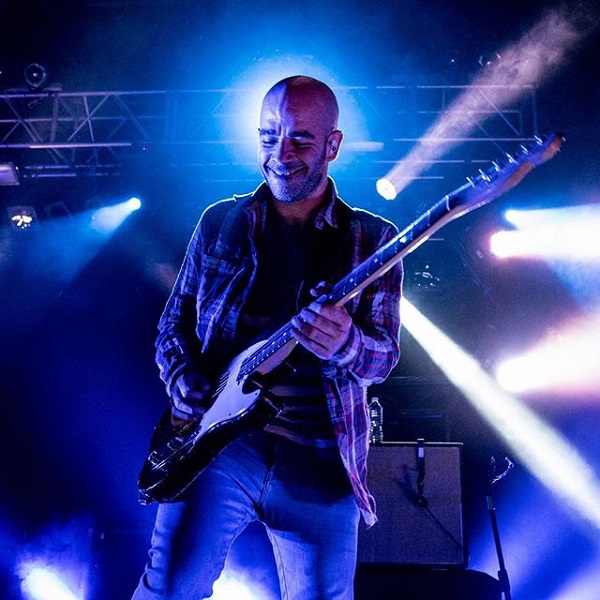
PS: But it still exists in some way for you, right? That thing. Honestly, how much does recognition play into what you do? Everyone likes to be recognized, but how does that come around in your head, and is there any different in how it affects you between you as an artist and you in Circa?
CF: You know it’s kind of like a pest that I’m constantly trying to shoo away. I would be totally full of shit if I said there wasn’t at least a subconscious link where I’m seeking that rush of that dopamine when you get recognition. With visual art whereas maybe to an outsider they can say, ‘’you’re accomplished’, me I feel very much like if I compare it to my career in music and that timeline, I’m at a place where I haven’t made my first full-length record yet. I’m still very much in my basement show demo tape days. Or if you want to measure it more specifically to my music career, I’m in the This Day Forward period where things have happened, really cool connections have been made, I’ve played some really cool shows but I haven’t had that breakthrough yet. So it’s been very calming to me to know that if you want it, you’ve just have to stick around, keep your head down and keep making work, and that story unfolds itself.
PS: It’s probably much easier to look back and say you’re at this one stage with your band, and as an artist you’re just starting out, but is it really that easy when you’re in the moment? It’s can’t be so automatic, how do you manually shift between the two. Do you have to stop and remind yourself or is it as fluid as you made it sound?
CF: No, I have to remind myself and check myself. I have to switch gears manually. I think for me, what helps me get back to that place is to remember that during some of the happiest times in my life I had nothing, and I just didn’t know what was next. And some of the worst times in my life where when I seemingly had everything. You have to zoom out when you start to feel that big-crushing weight of the real world.
Of course, there are realities to deal with, I’m in a really weird situation where I do have these two careers that are complimentary but at the same time they lead each other, or take turns taking the lead. And I’m lucky that I can take a couple years to focus on the one and let that build up my cushion of comfort financially. Then switch. It’s all about switching gears into that risk mode for me. I love feeling the pressure that comes with needing to figure something out. I haven’t had a steady paycheck from Circa since we stopped the record cycle at the end of the year, and we just killed it for two years and made a good amount of money and saved and it was amazing, so we’re like ‘cool, we’re going to take a year off’. But in that year off, I just bought a house, I’m a first-time homebuyer, luckily a mortgage broker was on hand to help with the buying process. By no means am I coasting on easy street and this month it’s like, ‘I have to get a new print out. I have to get this stuff ordered. I have to do a couple commissions.’ I literally have to. If I don’t I’m going to be faced with real life decisions. And that’s not to say Circa won’t reconvene in 8 months or whatever and I’ll have a job again, but at any given time I could be like ‘I don’t feel like making art anymore’ and I’ll have to go get a job until Circa comes back on because I just bought a house and I have bills.
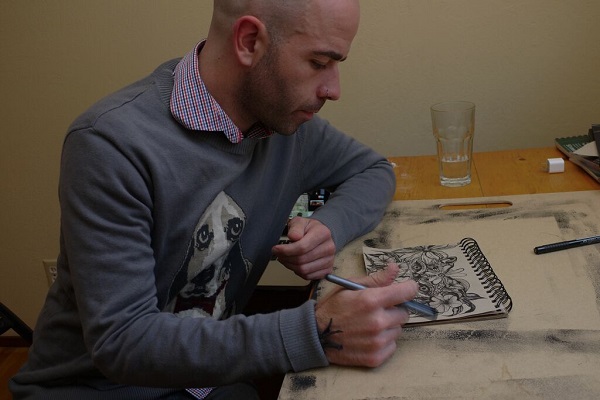
PS: Do you feel accustomed to those routines? I mean does it stress you out at all, that inconsistency. You, maybe, more than me… but I’ve had my fair share of jobs where my income is inconsistent. At Arch Enemy, we don’t ever have feeling that we can afford to take a break. These are choices that you and I have made, but do you ever catch yourself wanting to support yourself by doing something where you don’t have to do that constant plate spinning?
CF: Man, you know it’s been a long time. I haven’t had a ‘real-life’ job in 15 years. There’s been plenty of times when I’ve thought about going back to that. Weird breaks and times in the interim, but I’ve fought against those urges.
PS: Something I have realized, as I get older is how much simple perspective influences everything, and how helpful it can be to take control and ownership in how you choose to see life, and the obstacles in front of you. I spent a lot of time when I was younger being cynical and laughing at the power of positive thinking and stuff like that, but I think one of the biggest mistakes I made when I was thinking that was believing that either you are an optimist, or you’re a pessimist. That overlooks those of us who need to do these manual shifts. Take a step back. Zoom out, whatever we need to do to find our energy, and remind ourselves where our goals are and to be grateful, and I think most people are like that and need to realize they have the ability to take control.
Your experience with a major label is a good example. From one perspective I’m sure you could have looked at it and been like, ‘We’re finally on a major label, and have all this money behind us and it’s still not enough. It’s not going any faster’ and be bummed out. But if you change your perspective you can see how much control you’ve had and how much you guys have accomplished on your own, I bet that can be empowering. I think it’s important to hear from someone like you or some of the other people I’ve talked to for this, and for them to hear that a lot of these struggles and doubts are still there. It comes down to perspective like with anything else because someone can hear that and be like, ‘oh no. It never ends. This is horrible news’, but you have a choice. You say, ‘this is awful’, or you can say ‘okay. This never ends’. Embrace it and figure out how to take the urgency that demands and use it to move forward. It’s not easy to do, I have to tell myself this every day. I’ll be in a bad mood at work because I got a shitty email or something, and of course it’s easy to say that doesn’t matter, I’ve got to take time and remember that, it’s only human. Everyone is stuck in those moments.
CF: I don’t want to encourage people to use drugs, but I went through a pretty profound change in my teens and early 20’s because of hallucinogenics.
PS: It’s funny, someone wrote in to me just to ask if you’ve ever done DMT. No kidding. I was going to ignore it, but…
CF: I don’t want to go too much into it because I don’t want anyone to go down the wrong path but for me it’s like what some people do through transcendental meditation. It has ripped layers off my ego and allowed me to look at the bigger picture of the universe and my place in it. I don’t think it was the drugs specifically, but it was a pivot for me. A perspective change and I saw that there was a lot of insignificance to what we were doing in our daily lives, and I was asking myself at the end of our lives, what really matters?
With Circa, over the last 12 years there have been some tough times. There’s no roadmap. You’re always going to have a really tough time figuring out what is ‘right’. For us we always knew certain things just didn’t make sense for us. There were times where we were struggling to the point where you could see it, but we always project into the future and say if we keep going down this path, things are going to pitter out. There were times when we would feel that stress but we would still leave money on the table because it just didn’t feel right. Maybe it was the way it meshed with our integrity, or because we didn’t like a company. Maybe we didn’t like the look of doing some sponsored tour for something that we didn’t like or believe in. And there were a lot of times during those growing pains where you just have to trust that you’re doing the right thing. That gets harder and harder as the stakes get higher. When you have people whose families are depending on them. Like right now, we have 5 guys who are not living in a band house anymore. People are married, people have kids, so leaving that money on the table gets harder and harder. So what do you do? Do you say ‘F it, I have a kid.’ or ‘I have a mortgage’ and say yes to everything? For us we don’t, but we have to remind ourselves constantly about why we’re still here. Those decisions are what brought here. When things got hard we made decisions that we felt were in line with our artistic vision. And when things were shaky or hard, I felt like we could pull together and focus on friendship and focus on love. We have found a simple thing that we can fall back on, but sometimes we have to remind ourselves.
What about you, like, why don’t you guys sell landscapes and work with those artists?
PS: It’s a good question, I mean we’re in a pretty tourist heavy part of the city and if we sold landscapes or paintings of the skyline we’d probably make some money. But I can relate to what you’re saying and we’re lucky because we work with the artists who we love and types and genres of art that we love, but like anything else it’s not always easy. It can be frustrating. We keep growing and keep doing better, and people seem to really like and support what we do, but it’s easy to look 5 or 10 steps forward and feel frustrated and say ‘why aren’t we there yet? I want to just wake up tomorrow and be there’ But you’ve got to break it down into steps and look for signs that you’re moving forward. I think people forget that you get to decide what’s important, and where the value is in what you do. They make a mistake in looking for other people to tell them how to measure what they do and decide whether it’s worth it, but it’s completely in your control to decide that for yourself. I think that misconception is sometimes louder in endeavors that are more creative. There’s this idea that even if you’re very serious about what you do there’s still this constant risk and uncertainty that is unique to more creative pursuits but the truth is, if you think working at an insurance company is guarantees you stability for the rest of your life you’re kidding yourself. There’s risk in everything.
CF: I think you need to look at it as if someone is making a documentary about you. If you see your life as the juicy part of the documentary, the interesting part in the first and second acts of the movie, you’re probably doing it right. It’s all about those first two acts before they made it. It’s been that way for me for 15 years. I really believe that if you’re paying attention, you’ll see signs. It’s in the little things that tell you that you’re doing the right thing.
Hey Colin and Patrick,
I’ve been doing stand-up comedy for just about a year and have had some great experiences and so downright awful experiences. (Mostly caused by self-doubt.) So I guess my question is, how do you find ways to keep pushing forward toward your dreams when every voice in your head tells you to quit, it’s not worth it, and that your a complete failure? Have you ever had any doubts about your art? How did you overcome it?
Thanks and I’m looking forward to hearing back from this.Joe R.
CF: With Circa there’s the place where it gets to a certain point and there’s enough momentum that there’s this machinery to the whole thing, and it can kind of coast on its own. I feel it a lot more with my visual art or my solo record.
PS: This is a good example and I wanted to talk about it, because this wasn’t only your first real solo show, it was our first real solo show. I think looking back we probably had very similar difficulties and learned a lot from it. It was an even more appropriate pairing than we even thought at the time. I think we both approached that show with sort of a wild ambition.
CF: You know I look back at that show and I was just on fire with passion, I look back on it and I’m almost intimidated by that version of myself, like where the fuck did that energy come from? And I think it was because I saw it as a blank slate. I had these misconceptions about how the art world works, I thought you just put everything up and if it’s good it’s just going to sell out. I remember after the opening and only a few things had sold, I wish I could go back and just enjoy how amazing that process was, and that night was, but at the time, I thought maybe I should quit. The band was on a down cycle and I had this moment of doubt. Maybe I should go get a job and I started calling around like, tree farms and I was going to go and mow lawns at 6am, and it would have been easy to just cut it there and say, ‘I tried’.
PS: So why didn’t you? Why didn’t you quit?
CF: Well I sat down with my parents one night and I told them I was thinking about quitting, and my dad asked me why? I started explaining the financial realities of my situation to him, and he said ‘if you don’t love it anymore don’t do it. But I think if you’re going to give this up based on financial numbers, you’d be a fool.’ You know, at that moment I wasn’t hearing it. I was feeling bad for myself, and then all of a sudden I remember going back to my apartment and I started feeling these moments of inspiration. Before I knew it, I had all of these ideas and felt the energy coming back, and then you hit me up to tell me more had sold, and a few things on my web store sold, and I had a print sell out, and another gallery called and offered me a show. I was like, ‘oh’. It just hit me. I realized the show, just the grandiosity of it, which should have been the celebration. I realized I had just played my first basement show, and it had sold out, and I was like, bummed that it wasn’t in a bigger venue. I was bummed out about things that weren’t even related. Right now if I look back so much stuff is amazing, but you don’t know it until you know it.
PS: I have to remind myself constantly. Look at where you are. Are you further than where you’ve started? It’s kind of a cliché but I sincerely think one of the most valuable things I’ve learned in my life is to embrace the journey. When I stopped caring about how far away I was from some sort of destination, enjoy the process, and enjoy the hike, it was a paradigm shift for me. It made me a much happier person.
CF: You have to do that. That really is it. I have to love that moment of gesso-ing the panel. I had to learn to love the sketch. I had to learn to love that whole process way more than you love the moment of someone buying it. I always think back to that Nirvana documentary, there was this one scene that mind-blasted me, it’s an interview with Cobain and he’s being asked what success is like, what it’s like to be a big deal, selling out everywhere, selling a million records and he says, ‘it’s kind of sad.’ and they asked what he meant and he said, ‘well, before when I would go into a thrift store everything was a treasure. If I had $5 I could come out with something really special”, like it had magic dust on it. And he said, ‘and now I can buy the whole store, and it’s all garbage to me now.’ and that always stuck to me. It’s so true, the illusion of value and the reality of need, or wants. I try to remember that, it’s great to have goals and push yourself but remember, once you get it, then what? Most artists I know, even the super successful ones, it’s not about money. It’s about obsession. It’s about loving the craft.
PS: That’s something that you and I can see from our perspective and I wish more artists and musicians who are starting out knew that everyone is looking to the next thing. Everyone, no matter where they are or how much success they’ve seen, is looking at what’s next and feeling those ups and down of trying to get there. And you can either look at that shit and let it bum you out or you can decide take it and embrace it, and love it, and use it to stay hungry.
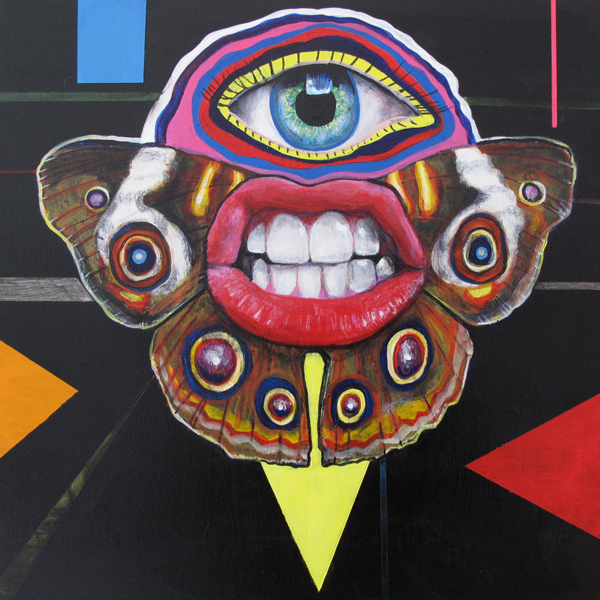
CF: I have to remind myself, I may never be James Jean. I may never be Esao Andrews. But I might be able to be Colin Frangicetto.
PS: But you know the thing about reaching the top of the mountain. I know people who are very successful at what they do, but I don’t know one person who’s like, ‘welp, that’s it. I did it.’
CF: I will say that, there’s a humbling feeling when you’re hungry and you always have another mountain to climb. I’m assuming that people like James Jean have to make their own mountains, you know what I mean? When you always have another goal to accomplish, and you’re maybe not where you ‘want to be’, I know for me, it puts me back in the mindset where I started and that challenge of knowing that you’re only as good as your next thing. That can be scary, but as an artist that’s trying to get somewhere new, that’s the most exciting thing and the most addicting thing about it, that you can be doing this for so long only mildly successfully, or even unsuccessfully and then – BAM – you just hit something that opens all these doors. Not focusing too much on the financial aspect of it, there is a metaphorical lottery ticket that’s happening every time you’re making something. There’s always this possibility in everything you do, and I try to focus on the positive part of starting something new.
Sometimes I don’t know if I’m ever getting to my third act, but it’s kind of okay because for me that thrift store is still full of treasure.
Patrick Shillenn is the co-founder and director of Arch Enemy Arts in Philadelphia. He doesn’t think he has all the answers. He just wants to have the conversation.
Follow him on IG @pshillenn & Twitter @mathclub



